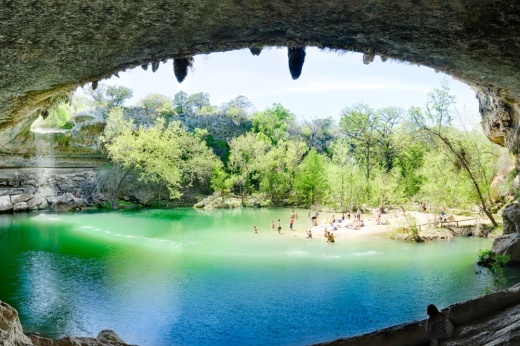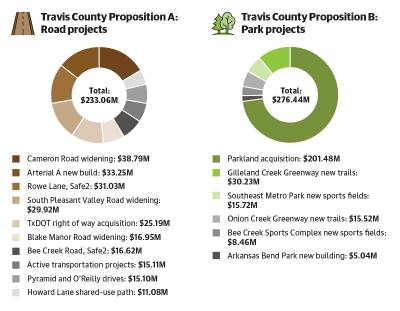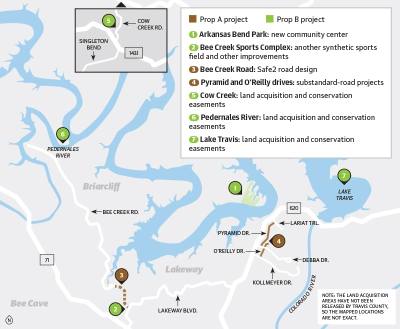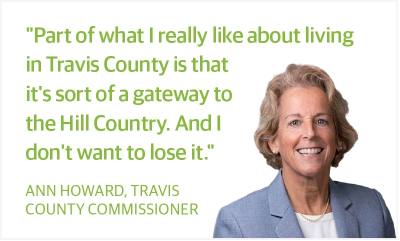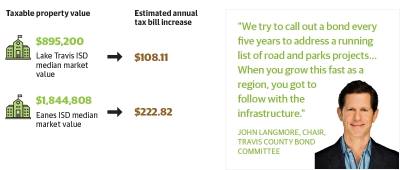The $509 million bond is focused on making roads more pedestrian friendly, constructing miles of new trails along two creeks, adding new sports complexes for kids and buying up parcels of land to protect green space.
While calling a bond election is a regular process for the county, local leaders said this one is different.
As more golf courses and large-scale developments take up land near Lake Travis, leaders are seeking to purchase over $200 million of land to protect as green space.
“This is our last chance to do a large-scale acquisition of land,” said John Langmore, the chair of the Travis County bond committee.
Two-minute impact
The bond is split into two propositions. Proposition A would fund $233.06 million to improve roadways and add shared-use paths for pedestrians and cyclists.
If approved, the bond funds would allow the county to incorporate its Safe2 road design in several two-lane county roads without shoulders, such as Bee Creek Road in the Lake Travis area.
Instead of expanding those roads to four lanes, crews will add center and right-turn lanes where needed to keep traffic flowing. The design allows county roads to keep their scenic quality while still addressing traffic congestion, Commissioner Ann Howard said.
Proposition B costs $276.44 million and would add new trails along Onion Creek and Gilleland Creek, build new sports fields at Bee Creek Sports Complex and Southeast Metro Park, and acquire green space and conservation easements in the following areas: Cow Creek, Gilleland Creek, Lake Travis, Onion Creek, Pedernales River, Post Oak Savannah Springs and Wilbarger Creek.
Zooming in
While most of the roads listed in the 2023 bond are standard county projects, two of them—Pyramid Drive and O’Reilly Drive—mark a shift in county priorities, Howard said.
Pyramid and O’Reilly drives are substandard roads—roads that were built along with a development and are often unpaved. Travis County has over 108 miles of these roads, and they technically aren’t the city’s or county’s responsibility to fix, Langmore said.
During the bond committee’s community engagement process, a group of residents in the Apache Shores neighborhood successfully lobbied for the roads to land on the approved list of projects.
After visiting the site, officials found emergency vehicles could not pass on the roads.
Travis County’s move to include Pyramid and O’Reilly drives could open the floodgates for county leaders to tackle more substandard roads, Howard said.
Commissioners Court voted to create a task force that will explore what funding options are available to fix the county’s remaining substandard roads, including federal grants or tacking the construction cost on residents’ homeowners association fees.
The big picture
The 2023 bond marks the county’s largest package to date due in part to the county’s goal to spend $200 million on parkland acquisition.
County leaders said they were guided to invest in green space following a December 2019 Texas A&M University study found Texas loses about 650 acres of land per day to development while property values are increasing.
“There’s lots of development along [Hwy.] 71 and the lake. [There’s] a couple of golf courses going in and thousands of homes,” Howard said.
Howard added the region’s recent drought also inspired the county to invest in conservation easements—legally binding documents that restrict land from certain uses for environmental protection—near Lake Travis.
“We’ve got to act, or we’re going to lose all of this green space,” Howard said.
Parkland acquisition could have a fiscal impact as well: The same Texas A&M study found nature tourism and outdoor recreation brought in $35.9 billion to Texas’ gross product in 2019, nearly 2% of the state’s economy.
The cost
If the bond passes, project planning will begin immediately, officials said. Lake Travis-Westlake area residents can also expect an increase on their annual tax bill.
If the bond fails, no projects will move forward. However, the county does have another financial option that doesn’t require voter approval if officials still want to break ground on some projects, officials said.
After Travis County’s $287 million 2015 bond to create a new family courthouse narrowly failed, county leaders issued debt through a certificate of obligation—debt cities and counties can issue for new buildings, road improvements or other projects without voter approval—to fund it. The courthouse opened in December 2022.
What’s next?
Election Day is Nov. 7. For more information on the 2023 election, visit www.communityimpact.com/voter-guide.




